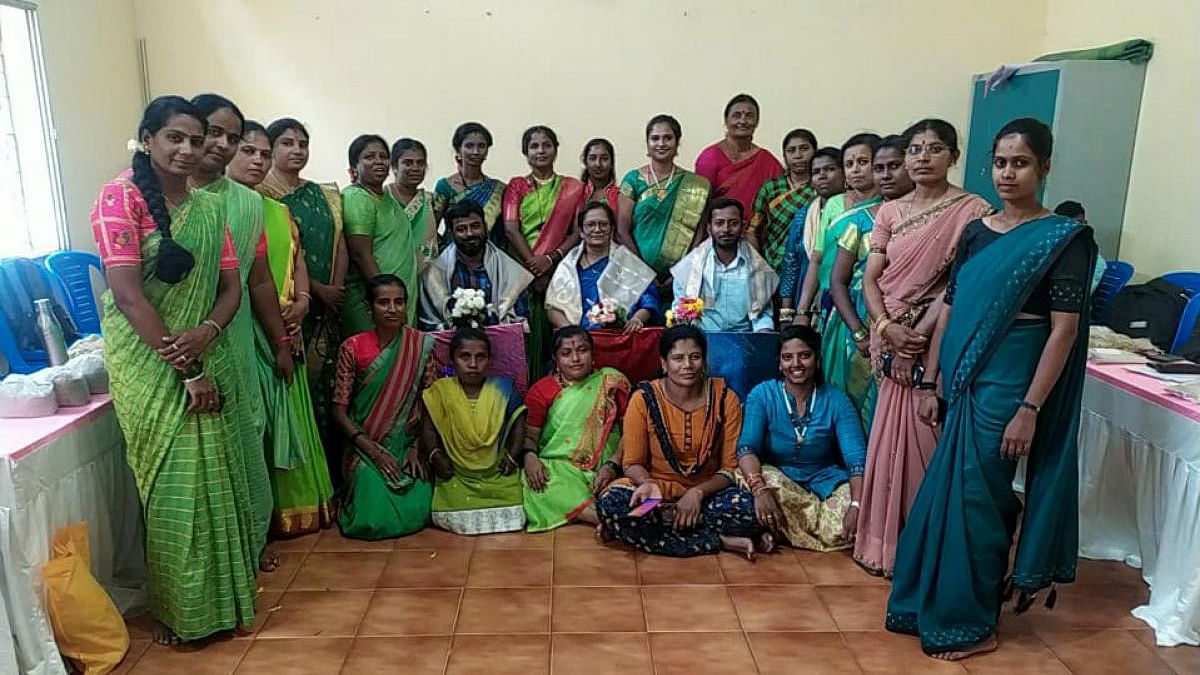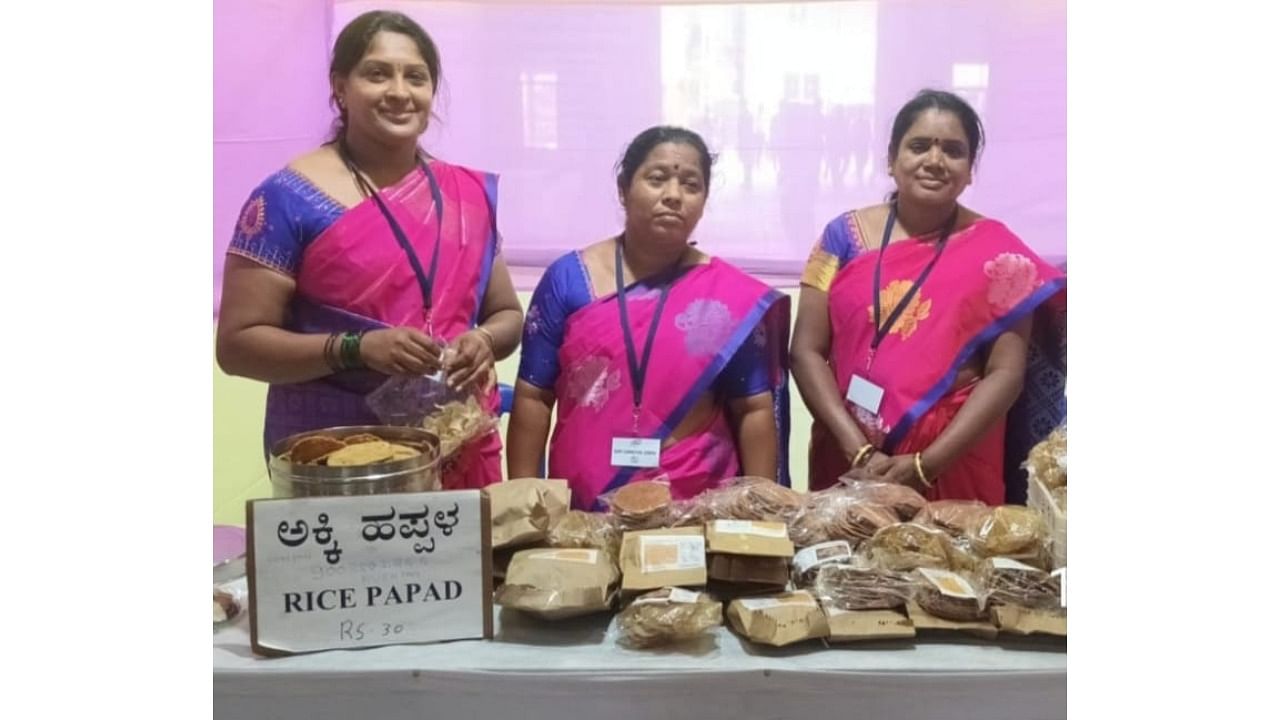

The number of women entrepreneurs in India is at a dismal 13 per cent and, last November, I was chosen to give a hand. I had to teach entrepreneurship to 50 women from Bengaluru Rural district for five months, hoping they would train 5,000 more women.
A journalist by profession, I was hardly qualified to do this. So I underwent a five-day intensive training in Hyderabad under Code Unnati, a project by United Nations Development Programme (UNDP) and United Nations Volunteers (UNV).
I signed up because I wanted to bring social transformation in villages, just like my hero, my father, who taught science-backed practices to farmers.
Trainer on a trot
I started my journey as a master trainer with a 60 km drive from BTM Layout in Bengaluru to Doddaballapur on a chilly November morning. Seated in a car, dressed in a cotton sari, specially bought for the day, I read through the Month-1, Day-1 lesson plan for the fifth time. I was to meet the first batch of 25 women, who were second PU pass or more, and were aged 22 to 50.
My goal: Help them to identify business ideas and train them in the nuances of setting up and sustaining businesses by employing fellow villagers. I had to cover everything from self-care to the seven Ps of marketing (product, price, promotion, place, people, process and physical evidence) in 25 days over five months.
I was counting on my seven-year stint at a teachers’ training institute to pull of this programme called Unnati Sakhi. Plus, coming from the ‘Startup City of Bengaluru’, I had seen small companies become unicorns, big enterprises fizzle out and people launch apps just to be their own bosses. I have also met amazing women like the legendary sociologist Scarlette Epstein, business leader Indra Nooyi and philanthropist Sudha Murty as a journalist. How hard could it be then to talk to rural women and launch and shape their career? I was to discover soon.
I reached the venue, a community hall, at 9.30 am, half an hour before the schedule. It was locked. A little irritated to be standing alone in my finery, I called Shivshankar, the assistant programme coordinator and my local contact. An hour up and still no trainees. Shivshankar was flustered because “madam”, that’s me, was getting impatient.
One Anandamma finally arrived at 11 am riding a pillion on a two-wheeler, profusely apologising for the delay. The rest followed. Some had to fight extreme control to come
for the training, I learnt. Their husbands had followed them to the venue to see if the trainer was a man!
We started the day with an invocation of Lord Ganesha in Kannada, ‘Gajavadana beduve, gowri tanaya’. Hijab-clad Rizwana was singing along. I was surprised! Nobody else in the room was.
Roll call
We started the introductions and I realised jargon like ‘entrepreneurship’ and ‘startups’ didn’t hold their interest. ‘Uddimedara’ and ‘vyapara’ did.
Anandamma said her day starts at 4.30 am, cooking a rice-based breakfast plus something more to pack lunch for her spouse and children. She is out of the house by 10 am to do her job, very many jobs, actually. She works as a local community resource person (LCRP), does part-time record keeping for an NGO, and assists the department of women and child welfare in cases related to child marriage, abuse, teen pregnancies, etc. She resolves domestic quarrels, convinces parents to let their children pursue their dreams and, in the meantime, has her lunch served in any house she is at — whether Rizwana’s or Rathnamma’s.
She knows her community in and out — which training programme works for them, which product sells best, who owes money to whom. Her day ends at 11.30 pm.
She does not own a vehicle. She takes a bus, hops on a tractor or just walks it all.
Anandamma does so many jobs already, why is she travelling 40 km from her village to take this training? I wondered about the woman in her 30s. She said she wanted to revive her batte (textile) business, which she had to shut down because of financial constraints. I gulped her answer with embarrassment. She had broken my urban definition of a career-oriented woman.
She wasn’t going to be the only one giving me a reality-check, I realised and, thus, asked Shivshankar not to talk about my career even though it spanned a quarter of a century.
Rathnamma spoke next. A bookkeeper for 52 self-help groups (SHGs), she completed Class 10 while laying roads or harvesting the fields as a daily-wage labourer to support her family. She is also a passionate singer and she once had a notebook where she wrote down 640 songs. “This Siddi borrowed it from me and lost it,” she complains of her close friend Siddagangamma, both in their late 40s. The latter confessed, “We must have dumped it with raddi (scrap) paper when we were moving houses.”
A lost treasure hasn’t dented their friendship. They had invested in an LIC moneyback policy nine years back and look forward to encashing it in their “old age”. They put away money every week in their SHGs. They twin in similar sarees during Ugadi and Deepavali. Both have the same amount of gold and silver jewellery that they pledge to make ends meet. They keep track of loans taken from each other and the pawnbroker.
Four introductions later, my urban arrogance about white-collar jobs, friendships and unity lay shattered. There were 21 more introductions to go that day and 25 later.
Reality bites
But is everything so idyllic, cohesive and secularly romantic in our villages?
Soon they confessed to bitter fist and hair-pulling fights in weekly meetings of women SHGs. They fight over who paid how much and why, and who gets the loan and who doesn’t. They use the choicest of expletives in Kannada, Telugu and Urdu often getting the whole village involved.
And then there are elections — panchayat, state and central — that tear them apart with bloodshed to boot. They are sharply divided on several faultlines — religion, caste, class and land. They use unparliamentary, and casteist slurs; unabashedly call their polio-afflicted colleague as kunti (one who limps) and another by cretinism as kulli (shorty).
Accustomed to debates on ‘person-first’ or ‘ability-first’ references and gender disparity, ableism and ageism, their brazenness was unsettling. But that is how they live — they are competitive but compassionate and they do it without pretence. Cities pride in nurturing an ‘ecosystem for startups’. But here, they rely on sisterhood as hardly anybody understands their ambition at home.
To see them collaborate with their bitter adversaries or train alongside them for 25 days was an eye-opener. So was their resilience to live through extra-marital affairs of their spouses, parents, siblings and friends, and their poverty, which they discussed over riotous laughter.
All of them, without exception, had tried their hand at a business, mostly to get out of poverty and also because they did not see promise in agriculture. They weren’t
chasing innovative ideas. They made businesses out of what they knew already — cooking, stitching, floriculture, etc. Some had failed, some had tasted success.
Overall, the trainees wanted to learn how they could market their business better. WhatsApp Status was their go-to way to promote products and services. I introduced them to Facebook and Instagram, and reel videos that they must shoot vertically. They would pack their products in plastic sheets and seal them with a candle flame. Since their target customers are people living in and on the outskirts of Bengaluru, a makeover was must. Try aluminium foil, newspaper bags and labels, I suggested.
By the end of the first day, I understood the training manual of 495 pages held little lessons for them. Their business strategies just needed polishing, so I decided to dump the training manual.
I also dumped the car on Day 2. I woke up half an hour early and took the bus to the nearest Metro station at Jayanagar, got down at Majestic and then boarded a bus to Doddaballapur. I could experience some of their struggles and connect with them, I thought.
The power of dreams
Every day, we learnt from each other. I discovered that doodling with Rangoli powder was a stress-buster like the pedicure I enjoyed — only more fun and cheaper. Quietly count to 10 before lashing out at someone, I taught them how to avoid an altercation. I learnt I could save Rs 10,000 a year by cutting my coffee consumption down by a fourth. They learnt ‘saving before spending’ is better than the reverse. We learnt to differentiate between our wants and needs.
We discussed leadership through the lens of mythology. Why did Sita have to follow Rama to the jungle? And why did Lakshmana leave his wife Urmila behind to follow his elder brother in exile? ‘The Ramayana’ was debated fiercely. To my surprise, Rama didn’t have many fans nor did Lakshmana for the way they treated their women but Ravana had, because he “respected Sita’s boundaries”.
Even brand names were hotly debated and altered. Manjula’s kurti label was changed from ‘Anjanadri’ to ‘Anju’s’ — the kurtis were meant for urban women and Anjanadri did not sound chic. Meanwhile, the trainees were also busy conducting five-day Entrepreneurship Development Programmes (EDPs) in their villages. Remember the aim was to build a cadre of 5,000 enterprising women eventually, across Bengaluru Rural, Dakshina Kannada and Raichur?
By the fourth month, my trainees had mobilised over 1,500 women to start micro-enterprises — from candle-making to organic Holi colours to incense sticks from flower and vegetable waste — and trained them in preparing business plans, finding sponsors and identifying the suppliers of raw material.
On Day 25, the trainees, now trainers themselves, hosted an exhibition-cum-sale of their products and services ranging from petticoats to paper-quill earrings and sambar powders to soaps, all handmade and eco-friendly. All were neatly packed and branded with a little help from Amara who wanted to start an ‘advertisement agency’.
The last I checked, on August 15, Manjula was expecting four more sewing machines to be delivered. She dreams to set up a garment factory with 25 women employees. Right now, she does it solo and I get my blouses stitched by her. Jyothi had set up a juice stall near Devanahalli. Rathnamma’s idea of ragi malt products for children was taking shape. And Anandamma was planning a Dasara launch for her batte angadi.
Meet the entrepreneurs
Anandamma runs a textile and tailoring business called ‘Anu Ladies Tailor’.
Usha Rani makes jewellery from beads, silk thread and paper under the label ‘Apoorva’.
Jyothi runs ‘Super Juice Centre’.
Gangaratna Designs sari accessories like tassels.
Sudha runs ‘Meghana Enterprises’, a line of spices such as kebab powder.
Uma runs Aisiri, a business to source terracotta crockery from potters and sell them on the highway.
Manjula's Anjanadri Garments specialises in kurtis and sari blouses.
Ratnamma sells jackfruit and ragi products in the name of Bhumika Health Products.
Gayathri makes pickles and spices under the brand of ‘Aishwarya’.